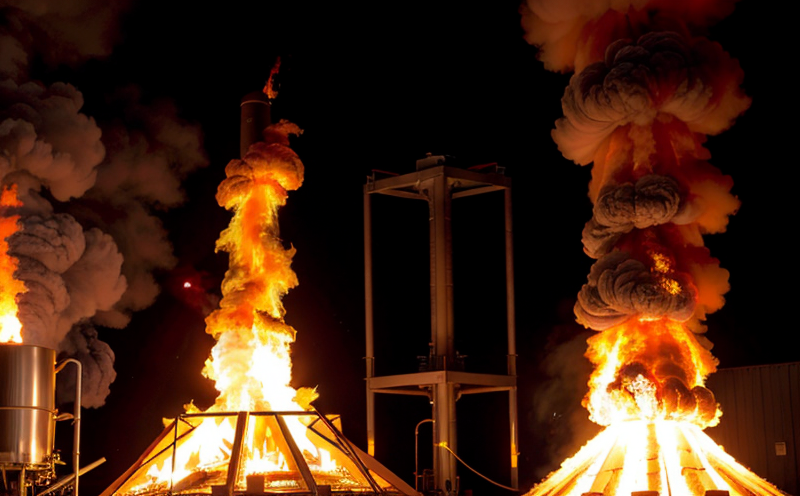Biofuel Flammability Testing
Understanding and ensuring the safe handling of biofuels is paramount in industries ranging from automotive to aviation. Biofuels, including biodiesel and ethanol blends, are not only crucial for reducing greenhouse gas emissions but also present unique challenges related to their chemical properties and flammability characteristics. This service focuses on providing detailed testing that ensures compliance with international standards while enhancing the safety profile of biofuel products.
Flammability testing is a critical aspect of ensuring product safety, especially when dealing with fuels derived from renewable resources. The process involves determining the limits at which a fuel can be ignited and burn in various conditions. This service employs advanced methodologies to assess the flash point, auto-ignition temperature, and explosive limits of biofuels. These parameters are essential for understanding how these fuels behave under different environmental conditions, such as high temperatures or exposure to sparks.
Our testing laboratory adheres strictly to international standards like ISO 6602, ASTM D4735, and EN 14987, which provide a framework for accurate flammability assessments. By using these guidelines, we ensure that the results are not only precise but also comparable across different biofuel products and testing facilities globally.
The importance of such tests cannot be overstated, especially in industries where safety is paramount. For instance, in aviation, ensuring that fuel used in aircraft engines does not pose a fire risk can mean the difference between safe operations and catastrophic failure. In automotive applications, understanding how biofuel blends interact with engine components under various temperatures helps in optimizing performance while minimizing risks.
In addition to these standard tests, we also offer custom solutions tailored to specific client needs. Whether it's adapting test protocols for new fuel formulations or providing additional data points that go beyond basic flammability limits, our team is dedicated to meeting the diverse requirements of biofuel manufacturers and suppliers.
- Flash Point Measurement: Determines the lowest temperature at which a liquid can vaporize enough to form an ignitable mixture with air.
- Auto-Ignition Temperature: Measures the minimum temperature required for a fuel to ignite spontaneously without any external ignition source like spark or flame.
- Explosion Limits: Establishes the concentration range within which biofuels can explode when exposed to an ignition source. This is crucial for preventing explosions in storage and handling facilities.
By leveraging these tests, we help our clients ensure that their products meet regulatory requirements while also enhancing overall safety standards. Our expertise lies in providing accurate, reliable data that forms the foundation for informed decision-making processes within your organization.
Benefits
Conducting biofuel flammability testing offers numerous advantages, particularly for companies involved in renewable energy sectors:
- Enhanced Safety: By identifying potential hazards early on, you can implement preventive measures to avoid accidents.
- Compliance Assurance: Ensure that your products meet all relevant international and local regulations.
- Risk Reduction: Minimize the risk of product liability claims by demonstrating due diligence in ensuring safety.
- Improved Reputation: Demonstrating a commitment to safety can significantly boost consumer trust and loyalty.
- Innovation Support: Our testing capabilities can help you innovate safer biofuel products without compromising on performance or efficiency.
- Cost Efficiency: Early identification of issues through rigorous testing helps avoid costly recalls and redesigns later in the product lifecycle.
These benefits underscore why investing in robust flammability testing is a wise decision for any company dealing with biofuels. It sets a solid foundation for sustainable growth while ensuring long-term success.
Industry Applications
Biofuel flammability testing finds application across multiple industries, including automotive, aviation, and industrial manufacturing:
- Automotive Industry: Ensuring that biofuels used in vehicles meet the highest safety standards is crucial for preventing accidents on roads.
- Aviation Sector: In aviation, the safe handling of biofuels is paramount to avoid any incidents during takeoff or landing phases.
- Industrial Manufacturing: Industries that rely heavily on biofuels for power generation or machinery operation benefit greatly from this testing to ensure optimal performance and safety.
In each of these sectors, the ability to accurately assess flammability characteristics is essential. Our laboratory ensures that your products are thoroughly evaluated under controlled conditions replicating real-world scenarios.
Why Choose This Test
Selecting biofuel flammability testing is a strategic choice for several reasons:
- Informed Decision-Making: Data-driven decisions based on rigorous testing lead to better product development and operational strategies.
- Regulatory Compliance: Staying ahead of regulatory changes ensures that your business remains compliant with the latest requirements.
- Risk Management: Identifying potential risks early allows for proactive mitigation, reducing long-term costs associated with accidents or non-compliance issues.
- Competitive Advantage: Demonstrating a commitment to safety can differentiate your products in competitive markets, attracting more customers and partners.
The reliability of our testing services, combined with the expertise of our team, makes us the preferred choice for companies seeking to enhance their biofuel offerings. By choosing this test, you are investing in a safer future for all stakeholders involved.





